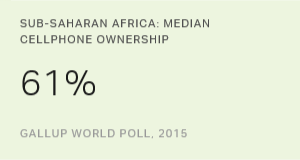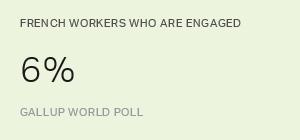Story Highlights
- Cellphone ownership highest in Nigeria, lowest in Madagascar
- Vast disparities between urban and rural communities
- Cellphone owners more likely to send financial help to others
WASHINGTON, D.C. -- Mobile phone ownership varies greatly across sub-Saharan Africa, from fairly ubiquitous ownership in Nigeria (87%) and Botswana (85%) to relatively scarce ownership in Madagascar (21%). These disparities underscore the digital divide that still exists in Africa -- despite the recent explosion of technology -- and show where this divide is likely a substantial barrier to future development.
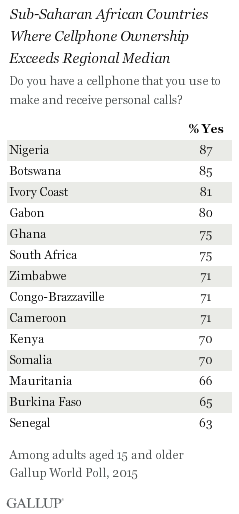
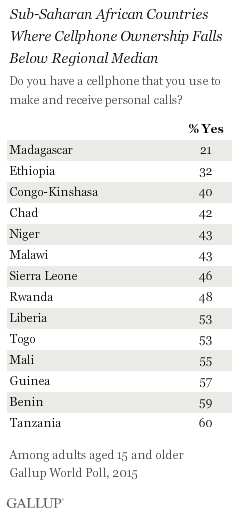
With mobile subscriptions reportedly closing in on the 1 billion mark, it is safe to say that cellphones have become commonplace in many Africans' lives. The median for ownership across the 28 countries surveyed is 61%. In most of the countries Gallup polled, majorities of residents said they own a mobile phone, and at least three in four residents in Nigeria, Botswana, Ivory Coast, Gabon, Ghana and South Africa report having one.
However, less than half of residents of eight countries say they have such a device. Slightly less than half of residents in Rwanda and Sierra Leone own a mobile phone, while about four in 10 residents of Malawi, Niger, Chad and Congo-Kinshasa do. Mobile ownership is least prevalent in Ethiopia, where about a third say they have a mobile phone, and in Madagascar, where the rate of ownership is about one in five. In both countries, most residents live in remote areas.
Gallup's data on cellphone ownership generally align with the World Bank's data on mobile cellular subscriptions.
Gap in Remittances Sent by Mobile Phone Owners and Nonowners
For many Africans, a mobile phone can be a lifeline through which they send financial help to their families and others abroad, or within their own countries. Africans who wish to send money, for example, can do so easily with the use of a mobile phone, while those without a phone might have to seek out other, more complicated ways of doing so.
In all of the sub-Saharan African countries Gallup surveyed, residents who own a cellphone are more likely than those who do not own a cellphone to have sent help in the form of money or goods to others in the past year, whether within their country or abroad.
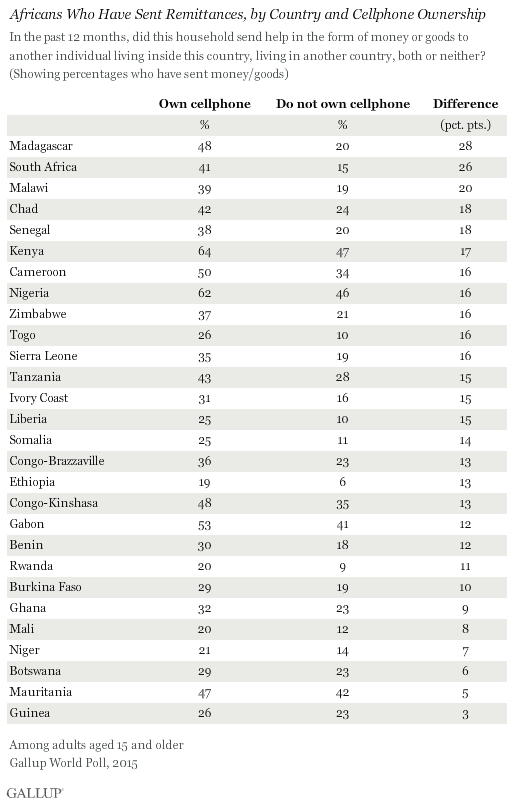
Mobile Phones More Prevalent in Urban Communities
In all but a few sub-Saharan African countries Gallup polled in 2015, urban residents are significantly more likely to own a cellphone than residents of rural areas. The exceptions are in Ivory Coast, Nigeria, Botswana and Kenya -- each of which has a majority of mobile phone ownership in both urban and rural communities. The differences between urban and rural communities in these four countries are all less than 10 percentage points.
But in most countries, the urban-rural technological divide is far more pronounced. The most drastic difference between urban and rural communities is in Sierra Leone: While 83% of urban Sierra Leoneans have cellphones of their own, only about a third of rural Sierra Leoneans do.
In several other countries -- Ethiopia, Liberia, Congo-Kinshasa, Mali, Guinea and Madagascar -- the urban-rural divide in cellphone ownership is nearly as large, with gaps ranging from 30 to 46 points between the two types of communities.
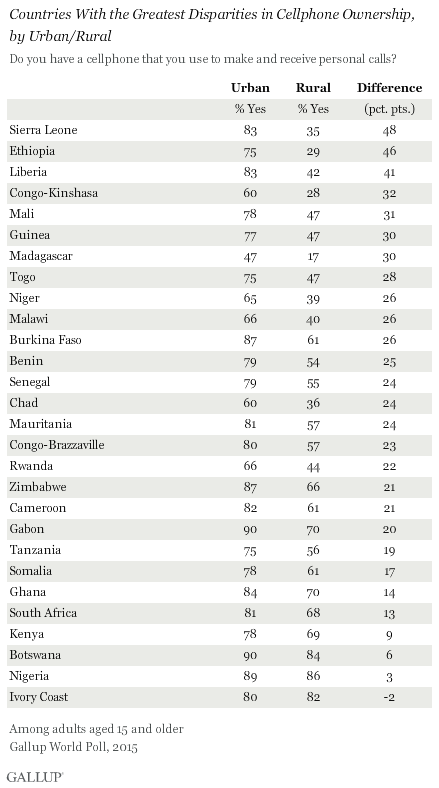
Bottom Line
In myriad ways, cellphone technology continues to transform the manners in which Africans live and contribute to their local economies. But the disparities in cellphone ownership illustrate how many countries and communities are not yet fully benefiting from new technology, and the need for better access -- especially in rural communities. Mobile phone technology has great potential for Africa's future, as it precludes the need to establish and maintain expensive landline infrastructure.
Increased cellphone access not only could benefit the lives and financial well-being of millions of Africans, but also could serve as a springboard to the United Nations' goal of reducing the barriers and costs of remittance transactions. Gallup finds that sub-Saharan Africans who own a cellphone are much more likely to have sent money or goods to others in the past 12 months, suggesting that their access to a phone makes the process of sending remittances easier, both logistically and economically.
These data are available in Gallup Analytics.
Survey Methods
Results are based on face-to-face interviews with at least 1,000 adults, aged 15 and older, conducted in 2015 in Benin, Botswana, Burkina Faso, Cameroon, Chad, Congo-Kinshasa, Ethiopia, Gabon, Ghana, Guinea, Ivory Coast, Kenya, Liberia, Madagascar, Malawi, Mali, Mauritania, Niger, Nigeria, Congo-Brazzaville, Rwanda, Senegal, Sierra Leone, Somalia, South Africa, Tanzania, Togo and Zimbabwe. For results based on the total sample of national adults in each country, the margin of sampling error ranges from ±3.4 percentage points to ±3.9 percentage points at the 95% confidence level. All reported margins of sampling error include computed design effects for weighting.
Learn more about how the Gallup World Poll works.
